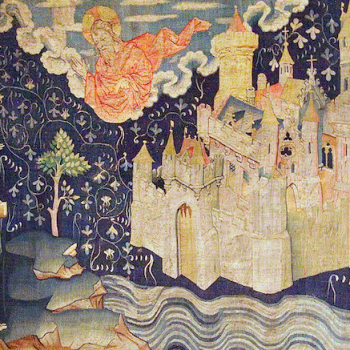Editors' Note: This article is part of the Patheos Public Square on Sacrifice: Religions and the Role of the Scapegoat. Read other perspectives here.
Something happens when you read René Girard — at least something happened to me. It's like light bulb after light bulb goes on. Kind of like I'm walking through a lamp store.
Surely I'm not the only one on this Patheos Public Square who will reference the eminent French anthropologist, he of blessed memory, he about whom I wrote extensively in Did God Kill Jesus? Girard opened up the idea of the scapegoating mechanism in human society in a way that explains, well, just about everything. But what's really intriguing, I think, is how religion plays a part in all of this.
It's easy to misunderstand Girard's talk of religion and scapegoating in a way that implicates religious leaders as the purveyors of violence. But Girard basically argues the opposite: religious violence makes society possible. By taking on society's unregulated violence and ritualizing it, religious institutions contain it, control it, and minimize it. If there weren't religion, Girard argues, violence would be much, much worse.
So here we sit, witnesses to the dénouement of Western Christianity. And we've got to wonder if Girard was prophetically right: without the strictures of a dominant religious system, will our society inevitably become more violent?
Western culture has never been free of violence, but Girardians might argue that we can't even imagine how much more violent it would have been without the harness of religion holding it back. Or we might argue that as religions have evolved away from blood sacrifices, those benefits of religion have lessened.
Although you'd be hard-pressed to find someone who thinks that we should re-institute the sacrifice of animals in our churches, synagogues, mosques, and temples, I have seen the extraordinary power of fleshly sacrifice; that's something I also wrote about in Did God Kill Jesus? It was in Sri Lanka, and it was a Hindu ceremony that takes place annually, even over the objections of local Hindu leaders.
While I won't advocate what took place (you can read about it in the book), I will say unequivocally that the ritual had a power that I have not experienced in nearly five decades of Christian worship. It was intense. It demanded something of its participants. It left an impression on everyone who was there.
We won't be bringing back blood sacrifice. Of course not, for that is exactly what Jesus' death meant to end. However, we might pause and consider why sacrifice and scapegoating have long been a part of religion. We might ask what we've lost in doing away with the rituals of sacrifice. And we might ask if, lacking the ritualized violence of religion, humans will simply act out our violent tendencies elsewhere.
4/13/2016 4:00:00 AM




